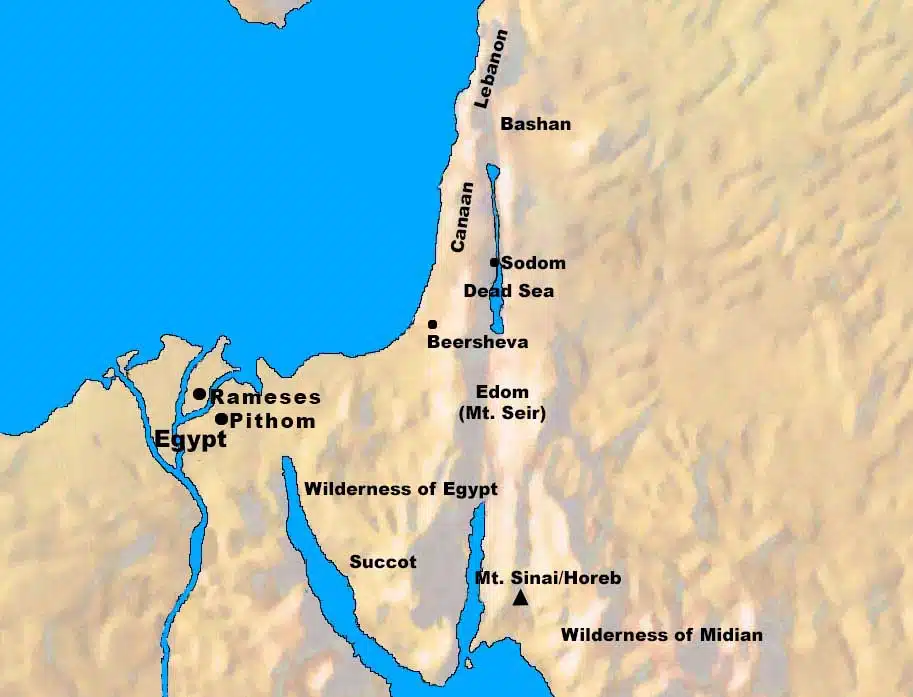Moses’ fourth objection centers around his feeling of inadequacy for the job God wants him to do. The job involved quite a bit of speaking, often in the presence of people in authority, like Pharaoh and the elders of Israel. Moses cites what might have been a speech impediment. It was his faulty view of God’s ability to overcome his speech problem that caused him to offer this objection.
In the first three objections, Moses questioned the LORD’s commission itself. In the first objection, he questioned His ability to choose the right person for the job. The second objection sees Moses questioning the source of the commission – the LORD Himself. Then the credibility of the commission is questioned in the third objection. The LORD overcame all of these.
In this, his fourth objection (verses 10-11), Moses changed his tactics. Here, he questioned his own ability to articulate the commission. Since there was nothing wrong with the commission itself, Moses told the LORD that there was something wrong with him. In order to convince his fellow Israelites of the LORD’s commission as well as convince Pharaoh to free the Israelites, he had to be able to articulate it accurately and effectively. Moses argued that he could not do this.
Another indication of Moses’ change of tactics is addressing the LORD with the phrase Please, Lord. The word “Lord” here is the Hebrew word for “master” or “lord.” This wording is used elsewhere in Scripture when a when a subordinate addresses his superior.
Moses then claimed that he had never been eloquent. The Hebrew literally reads “not a man of words am I.” Moses knew that his task involved effective communication of his message (actually the LORD’s) to both Pharaoh and the Israelites. It was his contention that he could not do this. Perhaps the forty years of primarily being around sheep made him think he was not equipped with the communication skills. Moses tried to argue that he had not been good at speaking, indicating that he had never been articulate. He then tried to imply that the LORD had not equipped him for this task since You have spoken to Your servant. In a way, Moses was telling God that He was being unfair by appointing him to a job for which he was not equipped, and He had done nothing to give him the ability to do this task. The reason Moses gave the LORD is I am slow of speech and slow of tongue. Literally, the Hebrew reads “heavy of mouth and heavy of tongue.” This means that his speech was slow and hard to understand and that he lacked the natural ability to speak in an articulate way.
It was a weak argument as seen by the Lord’s response in the form of a series of questions. First, the LORD asked, Who has made man’s mouth? By asking this question, the LORD told Moses two things – He can overcome all of Moses’ shortcomings, and He, in His sovereignty, made Moses the way He wanted Him to be. The second question confirmed this when He asked who makes him mute or deaf, or seeing or blind? Once again, the LORD sovereignly enables people as He sees fit, which meant that Moses had the exact capabilities that the LORD wanted. The third question was also the answer to the other two – Is it not I, the Lord? Knowing now that the LORD is the One who can do all these things, Moses needed to respond in faith. The LORD commanded him to go, but not without giving him even more encouragement. The LORD said that I, even I will be with your mouth. The LORD promised His presence with him and even used the very interesting phrase I will be with your mouth.
The Bible has a clear pattern of God choosing people to do His work who would not be a person picked by humans to do the job. In fact, passages like Psalm 8 make it clear that humanity as a whole is not the natural choice for the job of keeping an tending the earth. But God chooses earthen vessels in which to pour His treasure (2 Corinthians 4:7). At this point, all of Moses’ objections have been overruled by the LORD. There is nothing to keep Moses from obeying the LORD and accomplishing his task. However, he has one more objection.
Biblical Text
10 Then Moses said to the Lord, “Please, Lord, I have never been eloquent, neither recently nor in time past, nor since You have spoken to Your servant; for I am slow of speech and slow of tongue.”11 The Lord said to him, “Who has made man’s mouth? Or who makes him mute or deaf, or seeing or blind? Is it not I, the Lord? 12 Now then go, and I, even I, will be with your mouth, and teach you what you are to say.”
Check out our other commentaries:
-
Psalm 118:10-14 meaning
Three times the psalmist recounts how the nations surrounded him. Three times the psalmist boasts “In the name of the LORD I will cut them...... -
Amos 2:6–16 meaning
The LORD pronounces judgment on the inhabitants of Israel because they commit greed, unjust oppression, gross immorality, and idolatry....... -
Genesis 19:18-21 meaning
Lot replies that the mountains are too far to escape and requests to flee to a small town where he will be safe. ...... -
Ecclesiastes 2:18-23 meaning
Solomon examines the destiny of his legacy and the intrinsic value of his hard work, and despairs because he will leave it all to those...... -
Romans 2:25-27 meaning
Just and righteous living comes through living by faith. The Jewish people, who break the law and are circumcised, are the same as those who......



